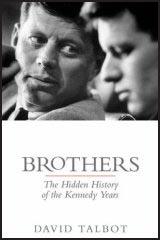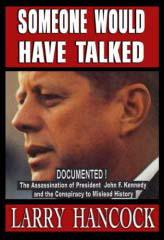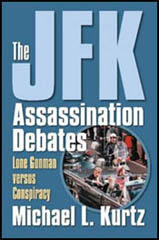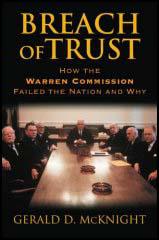Spartacus Review
Volume 2: 8th October, 2007
John F. Kennedy

Title: Brothers: The Hidden History
Author: David Talbot
Editor:
Publisher: Simon & Schuster
Price: £20.00
Bookshop: Amazon
Spartacus Website: David Talbot
Category:
Robert F. Kennedy was the first conspiracy theorist about his brother's murder. In this astonishingly compelling and convincing new account of the Kennedy years, acclaimed journalist David Talbot tells in a riveting, superbly researched narrative why, even on 22 November 1963, RFK had reason to believe that dark forces were at work in Dallas and reveals, for the first time, that he planned to open an investigation into the assassination had he become president in 1968. Brothers also portrays a JFK administration more besieged by internal enemies than has previously been realised, from within the Pentagon, the CIA, the FBI and the mafia. This frightening portrait of sinister elements within and without the government serves as the background for the emotionally charged journey of Robert Kennedy. Reading it, you can absolutely believe any number of people would have been happy for both brothers to meet a sticky end. The tragedy, not just for America but for the world, is that since their murders no one has had the nerve to stand against the dark forces they challenged in quite the same way.

Title: Someone Would Have Talked
Author: Larry Hancock
Editor:
Publisher: JFK Lancer
Price: £24.95
Bookshop: Amazon
Spartacus Website: Assassination of JFK
Category:
"Someone Would Have Talked" goes beyond proving a conspiracy to murder JFK. Over 14.000 documents, White House diaries, telephone logs, and executive tape recordings detail how the new President managed a cover-up that changed the future of our country. Forty plus years after the murder of President Kennedy, the same intuitive and popular belief exists that was common in the first hours after his assassination – that his murder occurred as the result of a conspiracy. The document releases, transcripts and tapes which have become available in the last decade only serve to confirm how many individuals and witnesses held this belief and expressed it privately but for the most part did not enter the public record. Someone Would Have Talked is supported not only with the normal references and bibliography but also with an extensive library of exhibits and documents. Exhibits range from contemporary newspaper articles through testimony and telephone transcripts to diaries, investigative reports and memoranda.

Title: The JFK Assassination Debates
Author: Michael L. Kurtz
Editor:
Publisher: University Press of Kansas
Price: £19.95
Bookshop: Amazon
Spartacus Website: Michael L. Kurtz
Category:
Who killed JFK? Ever since that fateful day in Dallas, theories about President Kennedy's murder have proliferated, running the gamut from the official "lone gunman" verdict to both serious and utterly screwball conspiracy theories. Michael Kurtz, a distinguished historian who has plumbed every crevice of this controversial case for more than thirty years, now sums up and critiques four decades of debate, while also offering provocative new perspectives. Kurtz presents an objective accounting of what we actually know and don't know about the assassination, underlining both the logic and the limitations of the major theories about the case. He then offers unique interpretations of the physical and forensic evidence and of existing areas of controversy, leading him to new conclusions that readers will find hard to dismiss. Kurtz shows how the official investigation's egregious mishandling of the crime-scene evidence - related to virtually every aspect of the case - is largely responsible for the lone gunman/conspiracy schism that confronts us today. Those responsible for that investigation (including the Dallas police, the FBI, and the Warren Commission) failed so miserably in their efforts that they would have been laughed off the air if they had been portrayed on any of TV's popular CSI series. One of the few experts writing on the subject who actually met Oswald, Kurtz also provides new information about the accused assassin's activities around the time of the assassination and about his double life, analyzing Oswald's ties to the intelligence community, to organized crime, and to both anti- and pro-Castro Cuban activists. Mustering extraordinary documentation - including exclusive interviews with key figures and extensive materials declassified by the Assassination Records Review Board - he both confirms and alters much previous speculation about Oswald and other aspects of the case. Who really killed JFK? Forty years later, most Americans still feel they don't know the truth and that their own government isn't telling them the whole story. This book offers a corrective to even the most recent "final verdicts" and establishes a sound baseline for future research.

Title: Breach of Trust
Author: Gerald D. McKnight
Editor:
Publisher: University Press of Kansas
Price: £19.95
Bookshop: Amazon
Spartacus Website: Assassination of JFK
Category:
That recent appraisal reflects a growing consensus that the Warren Commission largely failed in its duty to our nation. Echoing that sentiment, the Gallup organization has reported that 75 percent of Americans polled do not believe the Commission's major conclusion that Lee Harvey Oswald was the "lone assassin." Gerald McKnight now gives profound substance to that view in the most meticulous and devastating dissection of the Commission's work to date. The Warren Commission produced 26 volumes of hearings and exhibits, more than 17,000 pages of testimony, and a 912-page report. Surely a definitive effort. Not at all, McKnight argues. "The Warren Report" itself, he contends, was little more than the capstone to a deceptive and shoddily improvised exercise in public relations designed to "prove" that Oswald had acted alone. McKnight argues that the Commission's own documents and collected testimony - as well as thousands of other items it never saw, refused to see, or actively suppressed - reveal two conspiracies: the still very murky one surrounding the assassination itself and the official one that covered it up. The cover-up actually began, he reveals, within days of Kennedy's death, when President Johnson, FBI Director J Edgar Hoover, and acting Attorney General Nicholas Katzenbach all agreed that any official investigation must reach only one conclusion: Oswald was the assassin. While McKnight does not uncover any "smoking gun" that identifies the real conspirators, he nevertheless provides the strongest case yet that the Commission was wrong - and knew it. Oswald might have knowingly or unwittingly been involved, but the Commission's own evidence proves he could not have acted alone. Based on more than a quarter-million pages of government documents and, for the first time ever, the 50,000 file cards in the Dallas FBI's "Special Index," McKnight's book must now be the starting point for future debate on the assassination. It should also inspire readers to echo the "Journal of American History's" praise for his previous book: "McKnight's insistence upon remaining within the bounds of the evidence inspires confidence in his judgment."
